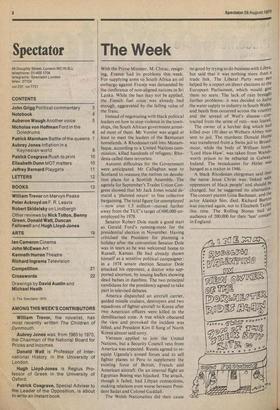The Week
With the Prime Minister, M. Chirac, resigning, France had its problems this week. For supplying arms to South Africa an oil embargo against France was demanded by the conference of non-aligned nations in Sri Lanka. While the ban may not be applied, the French fuel crisis was already bad enough, aggravated by the falling value of the franc.
Instead of negotiating with black political leaders on how to stop violence in the townships, the South African government arrested most of them. Mr Vorster was urged at least to meet the leaders of the Bantustan homelands. A Rhodesian raid into Mozambique, according to a United Nations commission, killed hundreds of refugees: Rhodesia called them terrorists.
Autumn difficulties for the Government were anticipated. Mr Callaghan went to Scotland to reassure the natives on devolution plans for a Scottish Assembly. The agenda for September's Trades Union Congress showed that Mr Jack Jones would demand a 'planned return' to free collective bargaining. The total figure for unemployed --now over 1.5 million—moved further away from the TUC's target of 600,000 unemployed by 1978.
Senator Robert Dole made a good start as Gerald Ford's running-mate for the presidential election in November. Having criticised the President for planning a holiday after the convention Senator Dole was in tears as he was welcomed home to Russell, Kansas. He had already shown himself as a sensitive political campaigner: in a 1974 senate election Senator Dole attacked his opponent, a doctor who supported abortion, by issuing leaflets showing dead babies in dustbins. The two principal candidates for the presidency agreed to take part in televised debates.
America dispatched an aircraft carrier, guided missile cruisers, destroyers and two squadrons of fighter aircraft to Korea after two American officers were killed in the demilitarised zone. A tree which obscured the view and provoked the incident was felled, and President Kim II Sung of North Korea almost said sorry.
Vietnam applied to join the United Nations, but a Security Council veto from America was expected. Russia agreed to reequip Uganda's armed forces and to sell fighter planes to Peru to supplement the existing force of British, French and American aircraft. On an internal flight an Egyptian Boeing was hijacked. The attack, though it failed, had Libyan connections, making relations even worse between President Sadat and Colonel Gaddafi.
The Welsh Nationalists did their cause
no good by trying to do business with Libya, but said that it was nothing more than a trade link. The Liberal Party were not helped by a report on direct elections to the European Parliament, which would give them no seats. The lack of rain broughl further problems: it was decided to halve the water supply to industry in South Wales, and heath fires occurred across the country and the spread of Well's disease—contracted from the urine of rats—was feared. The owner of a lurcher dog which had killed over 150 deer at Woburn Abbey was sent to jail. The murderer Donald Hurile was transferred from a Swiss jail to Broad" moor, while the body of William Joyce. 'Lord Haw-Haw', was taken from Wandsworth prison to be reburied in GalwaY. Ireland. The broadcaster for Hitler was hanged as a traitor in 1946. A black Rhodesian clergyman said that the name Jesus Christ was 'linked with oppressors of black people' and should, be changed, but he suggested no alternative. The concert pianist Gina Bachauer, and the actor Alastair Sim, died. Richard Burton was married again, not to Elizabeth Taylor this time. The Rolling Stones had all audience of 200,000 for their 'last' concert in England.


























 Previous page
Previous page